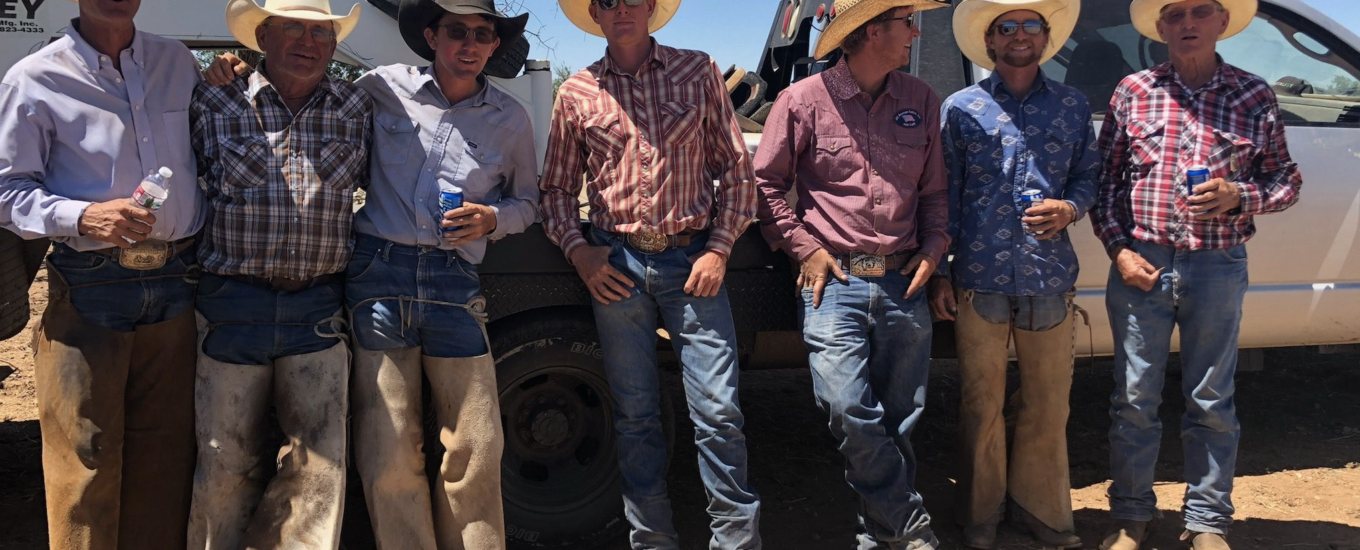Family Ties: The Rail 3 Ranch and the Blackmore Ranch
With family ties linking Arizona’s Rail 3 Ranch and Blackmore Ranch, the two ranches join forces to compete together on a WRCA ranch rodeo team.
by Paige Brandon
The Tale of Two Ranches
Describing the country as rough is an understatement. Cell service is a luxury, and a good horse isn’t just a tool but a requirement. Some would say the name of Skull Valley, Arizona, is appropriate. Others, like the Rail 3 Ranch, call it home. The terrain of Arizona is how the Blackmore Ranch and the Rail 3 Ranch started their woven roots.
Shelley Blackmore, the matriarch of the families, grew up in Arizona, going from ranch to ranch with her father, mother and two brothers. On one of the ranches her dad ran, the Bard Ranch, geneticist Elliott S. “Jack” Humphrey developed the Barzona cattle breed.
Jack owned the Rail 3 brand. He eventually sold the brand to Shelley’s dad.
“We’ve had it in our family since the ’60s,” Shelley said. “I leased the brand from my dad. Then later, he gave it to me, and I passed it on to Shad.” Shad Beebe is her son and the proprietor of the Rail 3 Ranch and its entities with his wife Sammi Jo, who he calls Sam.
The connection between Rail 3 and the Blackmore Ranch goes beyond family ties. The two ranches have a team together in WRCA.
“Every state is different, but here in Arizona, most ranches only have one or two cowboys,” Shelley said. “You don’t have a whole crew. If the ranches need help, they help each other. We knew we needed to partner with another ranch. There was no reason not to have the Blackmore and the Rail 3 team up.”
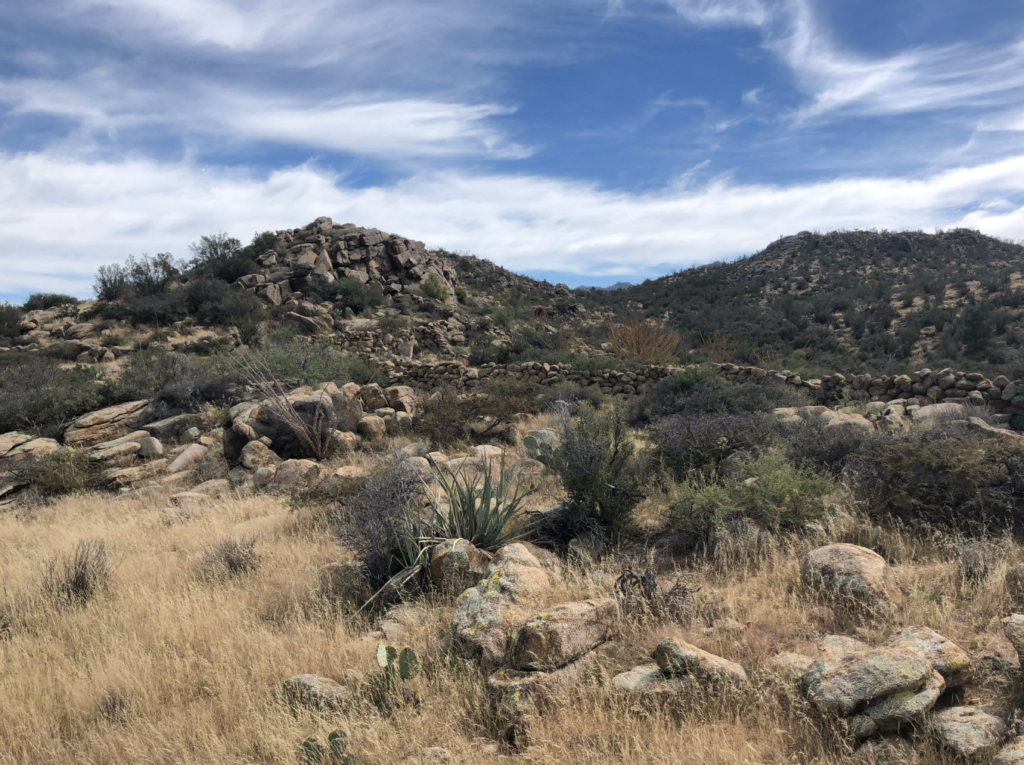
The Rail 3 Ranch
On June 6, 1998, Shad and Sammi Jo, married. Ten days later they moved to Oklahoma to start building the Rail 3 Ranch and its enterprises. They bought a small place from Sam’s parents, Hoss and Carolyn Dilday.
“I shod horses six days a week, and Sam raised the kids and put all the fires out at home,” Shad said. “After a while, we leased some ranches. We finally had enough country of our own that I stopped shoeing.”
After 15 years, they had a chance to buy the England Ranch in Arizona with Terry and Shelley Blackmore from Bob England. They traveled between Arizona and Oklahoma for five years.
“During that time, there was no house at the England Ranch so I lived in a tent all winter,” he said.
He had noticed his neighbor wasn’t running any cattle on his pastures. Shad called his neighbor and asked if they could lease it. Part of that lease included a house.
“I called Sam and told her we could have it, if we can get the cattle. She said, ‘Don’t call me back until you found the cattle.’ I got off the phone and 10 days later we had 5,000 cattle turned out.” The house painted a prettier picture than a tent, so the family decided to make Arizona their one and only home.
They moved the same year their team qualified for the WRCA World Championship in Amarillo.
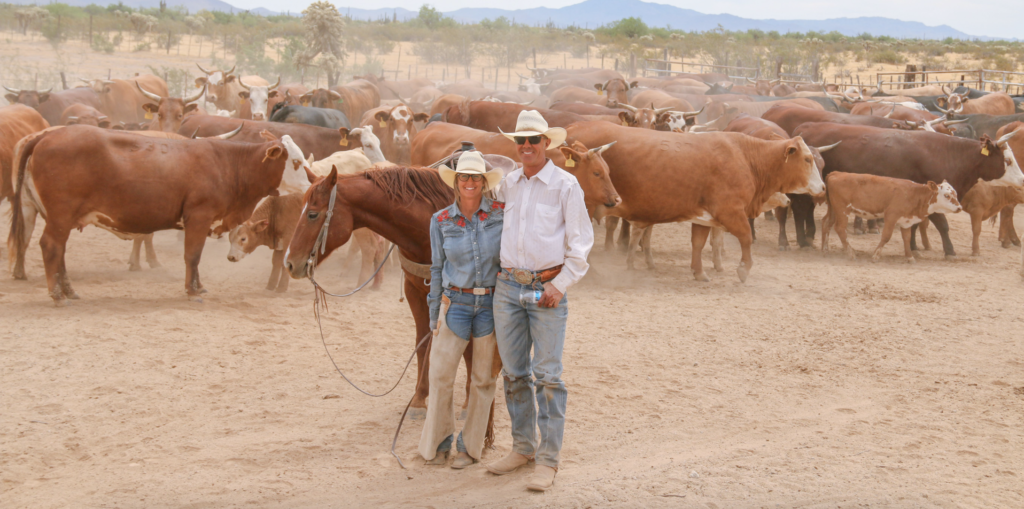
“We were on our way to Arizona when we went to the finals. We had a pile of ranch horses and everything we owned in four or five trailers. We stopped and left our horses, dogs, one cat and our things at Bob Jones’, a good friend of ours, and went to the rodeo. When the rodeo was over, we went to Arizona.”
Today, the Rail 3 Ranch is composed of four ranches and a farm, sprawling over 175 sections. Shad partners with Ozzie and Judy Gillum and Clay and Karen Parsons. Ninety-five percent of their land is public land. It is one of the major differences between their place and others, but it is also one of the largest battles they face.
“One open gate and you can spill a whole pasture of yearlings in no time,” he said. “Ninety-five percent of the people are great. They’re out enjoying the desert. Then there’s the handful that mess it up for the rest. When they leave gates open, it causes us so much extra work.”
Another battle they face is drought. Shad created a built-in insurance policy for the good and the bad years.
“All of these ranches are permitted for a certain number of cows. We run about 50% of that number because it forgets to rain out here sometimes. When it’s a drought, everybody sells their cows. They aren’t worth anything. When it gets good again, you have to buy them back. But then it’s at the top of the market and you can’t afford them. You can add yearlings when it’s good and are safe when it’s bad. Beefmaster cows can handle the bad times,” he said.
“If you take care of your ranch, your ranch will take care of you,” he continued. “But if you abuse it and graze it down, you’ll pay for it tenfold. Real ranchers are the greatest environmentalists because they’re going to take care of their country. They know if they abuse that ranch, they’re cutting their own throat.”
Outside of running cattle and horses, the Beebe family also hosts a yearly ranch rodeo and owns a leather shop. Shelley joked they do not know there are only 24 hours in a day.
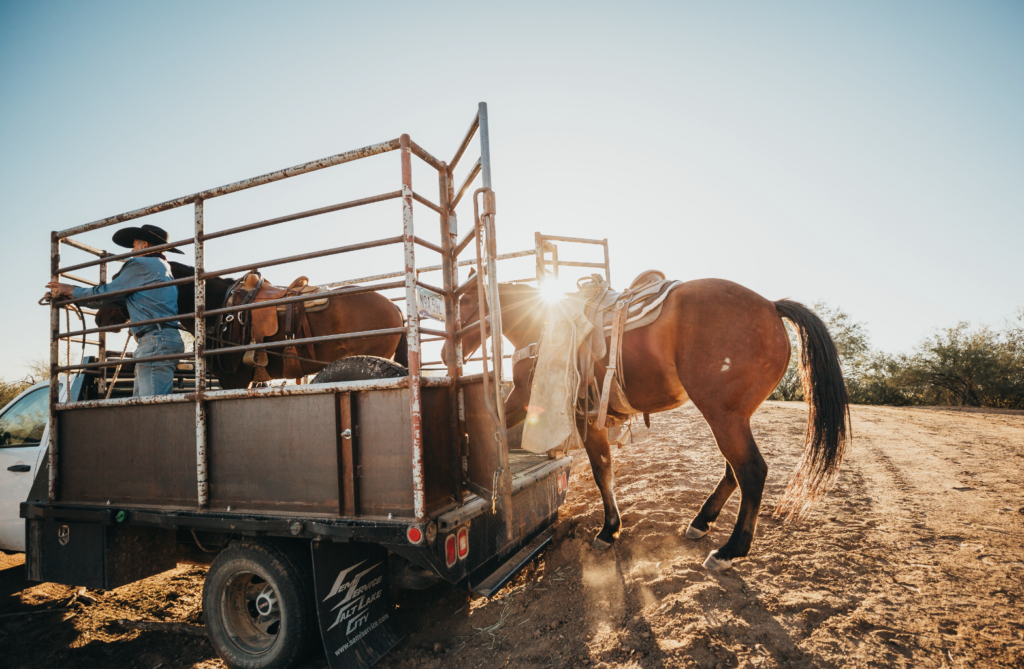
“If you take care of your ranch, your ranch will take care of you.”
Shad Beebe
Annual Tradition
Each year on the third Saturday of March in the historic town of Florence, the Beebe family hosts the Rail 3 Ranch Rodeo.
“I wanted to have a one-day rodeo that was different than most rodeos and would bring all the ranchers in this area together,” Shad said.
Before the rodeo, teams compete in team tying and a pyramid-style stray gathering. In team tying, the header and the heeler are both tied on to rope. The header will then get off and tie the hind legs. The pyramid-style stray gathering is when two teams compete at the same time. Two steers are let out simultaneously, and the team with the fastest time advances to the next level.
The rodeo includes the five WRCA-sanctioned events, with cow-puncher style bronc riding—meaning it’s one-handed and the contestant can’t blow a stirrup.
Shad attributes all the behind-the-scenes work to their daughter, Pecas Beebe-DeVries, and their family friend, Roger Biede. His son-in-law, Carly DeVries, and his crew do the groundwork during the rodeo. Terry and Shelley Blackmore, with Blackmore Ranch, are one of the many sponsors who helped make this an annual tradition.
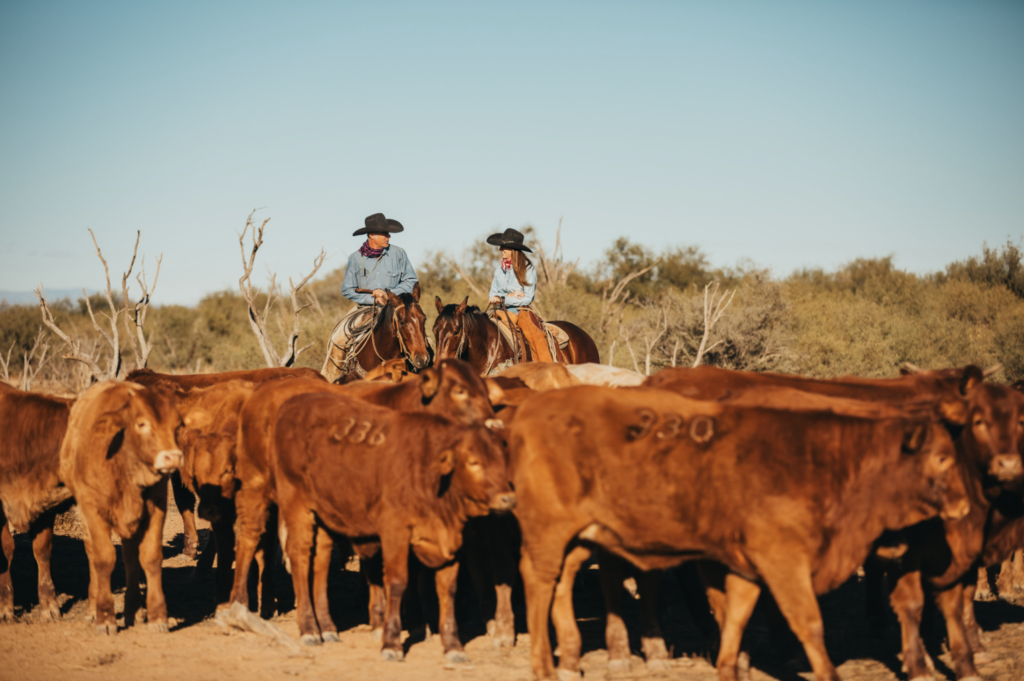
After the rodeo, they announce the Wheeler Reece Award, in honor of a local cowboy. It is given to those with influence who cowboyed and rodeoed.
“They’ve spent their whole life working and they were handy enough to go to town and be competitive,” he said when describing the deserving recipients.
The winning team receives a handmade Thor Peterson headstall buckle and prize money.
A Historic Legacy
In an adobe building built in 1898 on Main Street that was once a jail, a saloon and a newspaper shop, Pecas and her mom own the leather shop, Rail Three Ranch, in Florence.
Sammi Jo started the company in 1997 in Oklahoma. The company moved with her when they moved to Arizona. When Pecas graduated from high school, she started full-time in the shop, including redoing their website and running their social media accounts.
Their customers relate to the family’s ranching background, and Pecas finds it to be one of their draws.
“They appreciate it—knowing it’s coming from an actual ranch and ranching family,” she said.
She attributes her creative side to her mom and dad, who always encouraged her art. It came full circle for Pecas.
“I remember being in the shop and I had a little kid table,” Pecas said. “It was covered in nail polish, paint and every craft you can imagine. She gave me a Hello Kitty sewing machine when I was six and helped me make pillows.”
Their leather shop attends two main events a year: the Wrangler National Finals Rodeo and the WRCA World Championship. It was always Pecas’ goal to have a booth at the World Championship. One day, while shipping cattle, she received the call that they were invited to have a booth and have had one ever since.
“I call the booth the landing zone because everyone ends up there. It becomes a hub because our team is hanging out, sitting behind the register, and then everyone else shows up too,” Pecas said.
Shad added with a laugh, “Sam always wants us to qualify, and I don’t know if she wants me to qualify so she can watch me at the rodeo or so I can help her set up her booth.
Pecas’ two nieces, Reece and Reagan Rimmer, also help in the shop. It truly is a family affair for all parts of Rail 3 Ranch.
“You’re confident in what you’re doing because your family has your back,” Pecas said when asked how they do it all.
The Blackmore Ranch
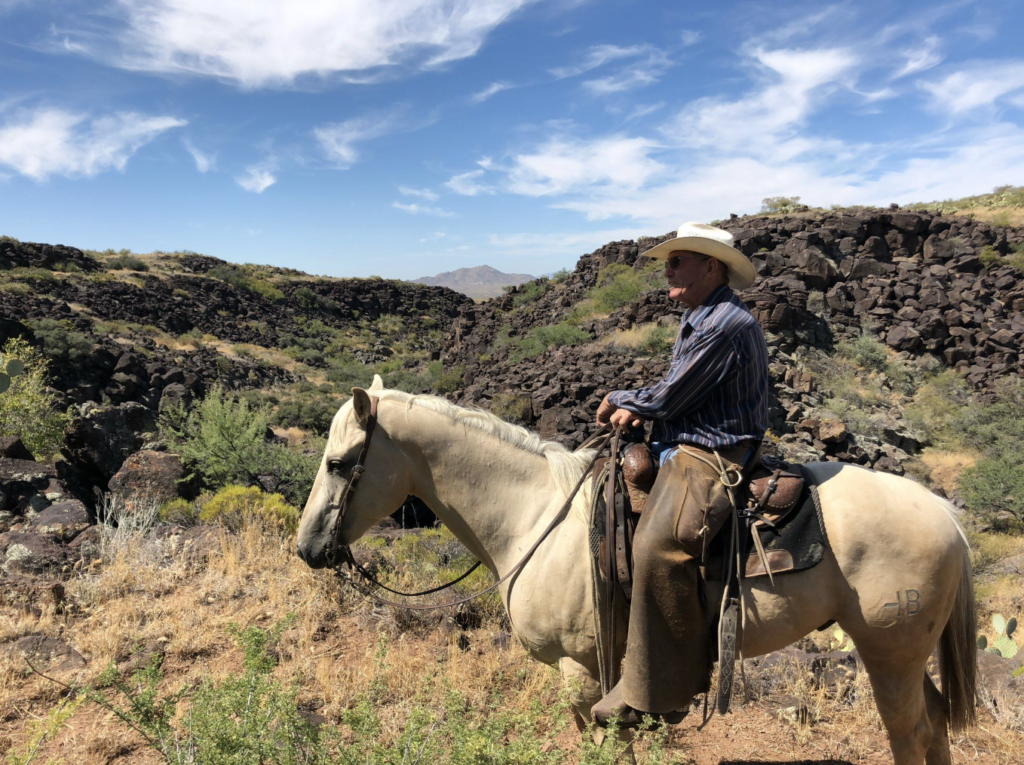
Terry, Shelley’s husband, was raised on a ranch in Southern California. He moved to Arizona and bought one of the original ranches started in Yavapai County in the 1800s. It is 15 miles from Kirkland, between Wickenburg and Prescott.
“We only bought what we called the home ranch, and it had about 50 sections in it. Then we added two more pieces back with it. Now it’s about a hundred sections. One of the pieces that we bought, we have a partner with. His name is Steve Hampton,” Shelley said. The majority of their land is under state lease and most of it is under one fence.
Shelley and Terry built everything from the ground up on the property. The ranch is under Terry’s guidance, who Shelley described as the heart of this ranch.
“We decided at the beginning that we weren’t going to go into debt buying cattle and trying to pay them off. We held our heifers and took it slow,” she said.
The Blackmore Ranch keeps their bulls on year-round. Dee Oles, the Blackmore ranch manager, credits this to the harsh landscape. They have to do most of their work horseback. By the time they gather all the bulls, it is time to push them back out.
“They built their cow herd to fit the country,” Dee said. “That’s what we do today. We try to put the right cows in the right spots. We focus on the efficiency of the cow, while still being good stewards to the livestock and the land.”
Four generations live on the Blackmore Ranch—Terry and Shelley’s son, David; David’s children, Carter, Devin, Tyler and Trey; Carter and Case Pope, the team’s bronc rider, and their son, Ryker; Terry’s father; and Shelley’s father.
“They keep saying the cowboy is going extinct,” Shelley said of popular opinion. “I don’t believe that. Look at these kids—it’s alive and well. The thing about ranching is that it doesn’t matter where you are, it’s one big family.”
Dee might not be related by blood, but Shelley and Terry have claimed his family as their own—a commonality within the ranching industry. The Rail 3 Ranch and the Blackmore Ranch joining forces in the arena was a natural choice for these families, who support each other outside ranch rodeos.
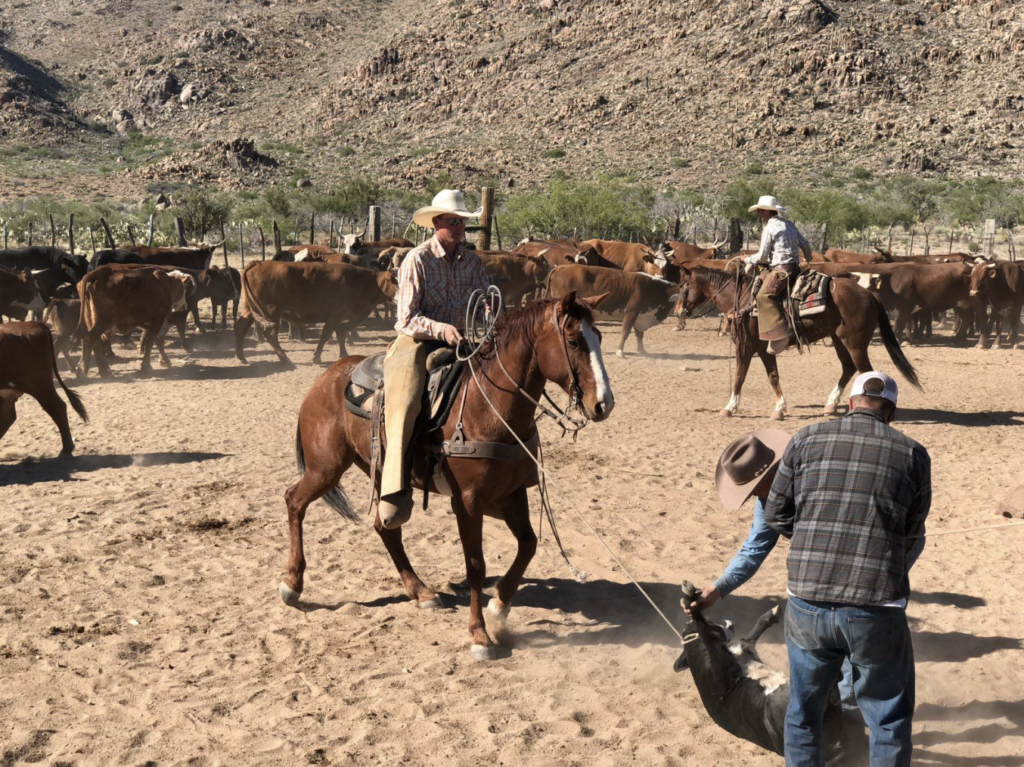
Shelley Blackmore
The thing about ranching is that it doesn’t matter where you are, it’s one big family
This article appears in the October 2024 issue of the Hungry Loop. Would you like to read more stories about the WRCA and ranching life? When you become a member of the Working Ranch Cowboys Association, you’ll receive the Hungry Loop and much more while supporting the working cowboy. Become a member today.

